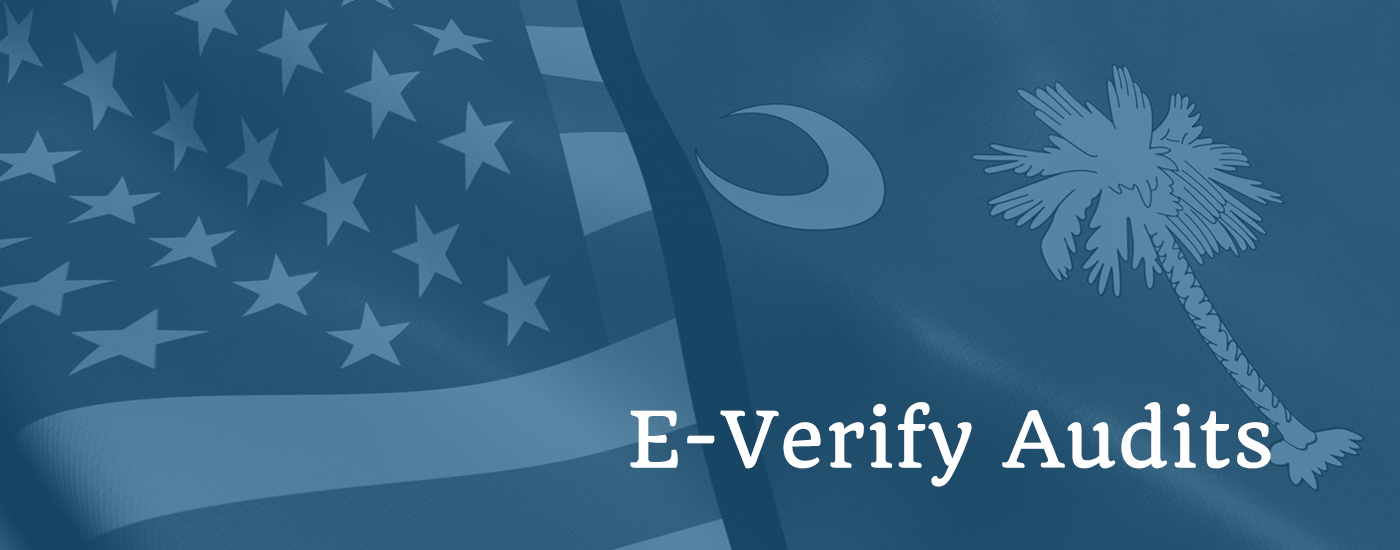
The South Carolina Department of Labor, Licensing and Regulation (LLR), through the Office of Immigration Compliance, is charged with investigating complaints and conducting random audits of private employers’ E-Verify compliance. If selected for an audit, LLR’s Office of Immigration Compliance will inform an employer in writing of the audit along with a copy of the “Audit of Employer” form to be completed and returned within a set period of time, typically within ten days of the notification letter’s receipt. An employer may request an extension of the response deadline for good cause, which the Office of Immigration Compliance may grant at its discretion.
Information requested of the employer by the Audit of Employer typically includes:
Following an audit, if LLR’s Office of Immigration Compliance determines that a private employer violated its E-Verify compliance obligation under SC Code § 41-8-20, the office’s Director will place the employer on probation for a period of one year, during which time the employer shall submit quarterly reports demonstrating compliance. Any subsequent compliance violations will result in the suspension of the private employer’s licenses for at least ten days but not more than thirty days. However, if a private employer has not committed a violation within the previous three years, any subsequent violation will be treated as a first occurrence.
When a private employer is found to have knowingly or intentionally employed someone who lacked work authorization in violation of SC Code § 41-8-30, LLR’s Office of Immigration Compliance must suspend the employer’s license for a period of at least ten days but not more than thirty days. During the period of suspension, the private employer must not engage in business, open to the public, employ an employee, or otherwise operate. After the period of suspension, upon demonstrating termination of the unauthorized worker’s employment and payment of a reinstatement fee not exceeding one thousand dollars, LLR’s Office of Immigration Compliance will reinstate the employer’s licenses. Subsequent violations will result in lengthier suspensions or revocation of the employer’s licenses, prohibitions on the ability to operate, and reinstatement fines. Importantly, if an employer engages in business or employs a new employee during any suspension period, the employer’s business license must be revoked. The license is ineligible for reinstatement for five years and only upon satisfaction of certain other requirements. A private employer may seek review of disciplinary action with the state’s Administrative Law Court.
Not only are employment compliance audits stressful to management and staff but also disruptive to normal business operations. Hiring an experienced attorney to lead the audit response effort can offset these negative consequences and ensure that a complete and timely response is submitted to LLR’s Office of Immigration Compliance. An attorney can monitor the audit’s months-long government review process and promptly respond to requests for additional information or documentation. Upon the audit’s conclusion, if violations are found to exist and the standard one-year probationary imposed, an attorney can advise the employer on an ongoing basis to ensure E-Verify compliance best practices are put in place and that the required quarterly reports demonstrate ongoing compliance.
This is an important benefit because federal and state employment compliance audits are rarely one-off occurrences. To ensure continued and future compliance, employers should expect and prepare for a follow-up audit in the future. Moreover, South Carolina law requires notification to U.S. Immigration and Customs Enforcement (ICE) of suspected unauthorized employment. This notification could result in a separate federal Form I-9 audit, which carries with it the possibility of significant civil monetary penalties and, in some cases, criminal penalties.
Employers committed to satisfying federal and state work authorization compliance obligations should consider hiring an attorney to review the organization’s E-Verify and Form I-9 compliance practices. Being proactive provides a valuable opportunity to educate staff and implement best practices as well as identify and correct errors and omission prior to future compliance audits.
There are many free E-Verify compliance resources online. E-Verify.gov includes employer and employee-focused guidance, “how to” videos, webinars on important topics, and timely program-related notices. Employers should be equally familiar with Form I-9 compliance obligations by reviewing the resources available at the federal government’s “I-9 Central” found at uscis.gov/i-9-central. A private employer’s obligations under South Carolina state law are outlined at Code of Laws of South Carolina Title 41, Chapter 8 Illegal Aliens and Private Employment, §§ 41-8-10 through 41-8-140.
Attorney Nick Harling has experience representing employers facing work authorization compliance audits, including South Carolina E-Verify audits, and training staff to understand and meet their immigration compliance obligations. To learn more about how Nick can help, please contact him by phone at 704-936-7617, by email at nick.harling@harling-law.com, or by using the form below.